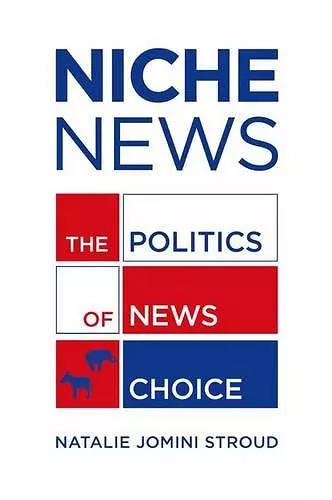Niche News
The Politics of News Choice
Format:Paperback
Publisher:Oxford University Press Inc
Published:26th May '11
Currently unavailable, currently targeted to be due back around 24th January 2025, but could change
This paperback is available in another edition too:
- Hardback£69.00(9780199755509)

Fox News, MSNBC, The New York Times, The Wall Street Journal, The Rush Limbaugh Show, National Public Radio--a list of available political media sources could continue without any apparent end. Niche News investigates how people navigate these choices. It asks whether people are using media sources that express political views matching their own, a behavior known as partisan selective exposure. By looking at newspaper, cable news, news magazine, talk radio, and political website use, this book offers the most comprehensive look to-date at the extent to which partisanship influences our media selections. Using data from numerous surveys and experiments, the results provide broad evidence about the connection between partisanship and news choices. Niche News also examines who seeks out likeminded media and why they do it. Perceptions of partisan biases in the media vary--sources that seem quite biased to some don't seem so biased to others. These perceptual differences provide insight into why some people select politically likeminded media--a phenomenon that is democratically consequential. On one hand, citizens may become increasingly divided from using media that coheres with their political beliefs. In this way, partisan selective exposure may result in a more fragmented and polarized public. On the other hand, partisan selective exposure may encourage participation and understanding. Likeminded partisan information may inspire citizens to participate in politics and help them to organize their political thinking. But, ultimately, the partisan use of niche news has some troubling effects. It is vital that we think carefully about the implications both for the conduct of media research and, more broadly, for the progress of democracy.
American news media and their audiences were proudly partisan during the nation's first century. A long period of nonpartisan news followed. Stroud's richly documented study demonstrates that we have come full circle. An influential partisan press has been reborn, making it easy for audiences to select congenial news only. This intriguing and insightful book explains the profound consequences for the future of American democracy. It's message deserves serious attention. * Doris A. Graber, Professor of Political Science, University of Illinois-Chicago *
A previous generation of scholars concluded that the evidence for selective exposure was uncertain, but Niche News begs to differ. Using a compelling mix of experiments, surveys, and content analysis, Stroud confirms that political partisans increasingly tend to seek out information that comports with their beliefs. Selective exposure is back, and Niche News shows why it matters. * Scott L. Althaus, Associate Professor of Communication and Political Science, University of Illinois, Urbana-Champaign *
Stroud's book offers an incisive and useful voice to the scholarly discussion about the extent and effects of partisan selectivity. She offers compelling evidence that partisan selectivity exists and is an important force in media politics. She also brings the path forward into focus. She opens her last chapter by noting, 'There are undoubtedly people who opt out of politics and avoid news media content altogether. And not everyone who seeks out political information from the media gravitates toward news sharing their political perspective' (p. 169). If we wish to come to grips with the seismic changes in media over the past decade, we must next tackle these aspects of the hyperchoice media environment. Thankfully, Stroud has made our work easier. * Kevin Arceneaux, Political Communiation *
Stroud makes a convincing argument that there are both positive and negative aspects to polarized political news reporting. Using primarily quantitative data, the author reveals how audiences use selective exposure, perception, and retention in their news-media choices and political arguments. * D. Caristi, Associate Professor of Telecommunications, Ball State University *
Stroud makes a convincing argument that there are both positive and negative aspects to polarized political news reporting... Stroud's work points out the leanings by both ends of the political spectrum. She calls for a media landscape that includes both partisan and nonpartisan media. * CHOICE *
ISBN: 9780199755516
Dimensions: 229mm x 155mm x 18mm
Weight: 363g
268 pages